October 13, 2020 •
Chicago Lobbyist Report Deadline Extended
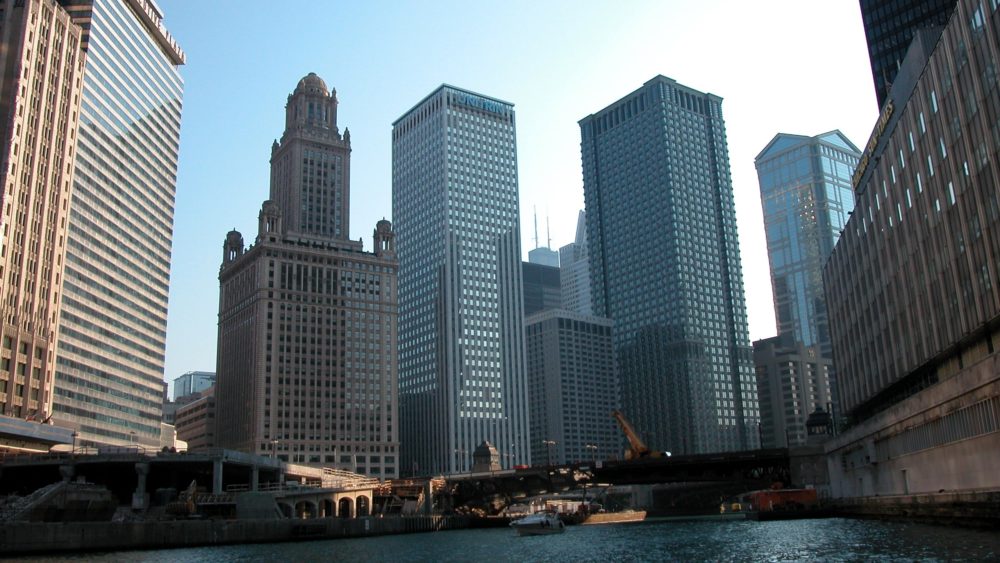
Chicago River at Michigan Avenue - David Wilson
The Chicago Board of Ethics extended the lobbyist third quarter activity report deadline. Due to problems with the ELF system, the deadline is extended from October 20 to October 26. Reports must be submitted electronically through the ELF system. The […]
The Chicago Board of Ethics extended the lobbyist third quarter activity report deadline.
Due to problems with the ELF system, the deadline is extended from October 20 to October 26.
Reports must be submitted electronically through the ELF system.
The ELF system has a new look but works the same way, and has instructions available under the resources tab.
A report is due even if there is no activity during the reporting period.
A report in DRAFT, PENDING REVIEW, or PENDING PAYMENT status will prevent filing of a new activity report until those filings are finalized.
October 9, 2020 •
Philadelphia Board of Ethics Announces Training Schedule

Philadelphia from South Street Bridge - by King of Hearts
The Philadelphia Board of Ethics announced the 2020 lobbying training schedule. The virtual training will cover ethics rules, registering, and filing expense reports with the Board of Ethics. At this time, it is not mandatory to attend one of the […]
The Philadelphia Board of Ethics announced the 2020 lobbying training schedule.
The virtual training will cover ethics rules, registering, and filing expense reports with the Board of Ethics.
At this time, it is not mandatory to attend one of the 2020 lobbying trainings.
However, attendance at a training will be credited when the mandatory training provision takes effect for registered entities.
Registration for the lobbying training can be accomplished at https://zoom.us/meeting/register/tJEqd-6srj0tHdGweXo4WfNtm4z9H7yiRooO.
Questions regarding the schedule or training may be directed to the Board of Ethics at Lobbying@phila.gov or BOE.Training@phila.gov
September 16, 2020 •
Chicago Board of Ethics to Enforce Lobbying Ban

Chicago River at Michigan Avenue - David Wilson
The Chicago Board of Ethics announced it will begin enforcing Ordinance 2-156-309 on October 1. The ordinance prohibits state and local elected officials from lobbying City Council or any city agency, department, board, or commission. In a press release announcing […]
The Chicago Board of Ethics announced it will begin enforcing Ordinance 2-156-309 on October 1.
The ordinance prohibits state and local elected officials from lobbying City Council or any city agency, department, board, or commission.
In a press release announcing enforcement of the ban, the board indicated it had been monitoring compliance and delayed enforcement of the ordinance, which took effect April 14, because a proposal submitted to City Council by Mayor Lori Lightfoot would have affected at least one lobbyist.
The board indicated sufficient time has passed and it has confirmed there will be no changes to the ordinance.
March 1, 2018 •
Candidate Asking Court to Void Cook County Pay-to-Play Limits
Cook County Assessor Joe Berrios is asking Circuit Court Judge Sanjay Tailor to void the county’s pay-to-play provisions. Current ethics rules limit campaign contributions from those who seek official action from the county. Berrios argues only the state has the […]
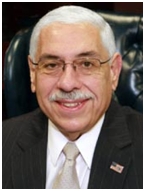 Cook County Assessor Joe Berrios is asking Circuit Court Judge Sanjay Tailor to void the county’s pay-to-play provisions. Current ethics rules limit campaign contributions from those who seek official action from the county.
Cook County Assessor Joe Berrios is asking Circuit Court Judge Sanjay Tailor to void the county’s pay-to-play provisions. Current ethics rules limit campaign contributions from those who seek official action from the county.
Berrios argues only the state has the authority to limit campaign contributions, while the county maintains it is permitted to set more-restrictive limits to avoid impropriety.
Berrios was fined $41,000 in January (after receiving warnings from the Board of Ethics last summer) for taking 41 contributions exceeding pay-to-play limits from property tax appeal lawyers affected by the decisions of his office.
As he waits for a court ruling, Berrios continues to accept contributions exceeding county limits.
Pictured: Cook County Assessor Joe Berrios
October 21, 2016 •
Chicago Board of Ethics Makes New Rule for Acceptance of Cubs Tickets
Last week, the executive director of the Chicago Board of Ethics told the mayor and aldermen they could buy Cubs playoff tickets at face value provided they went to the game themselves and were publicly acknowledged by having their names […]
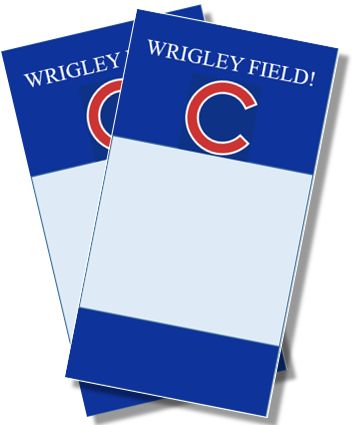 Last week, the executive director of the Chicago Board of Ethics told the mayor and aldermen they could buy Cubs playoff tickets at face value provided they went to the game themselves and were publicly acknowledged by having their names announced or displayed.
Last week, the executive director of the Chicago Board of Ethics told the mayor and aldermen they could buy Cubs playoff tickets at face value provided they went to the game themselves and were publicly acknowledged by having their names announced or displayed.
A new ethics interpretation, however, will take effect before the Cubs face the Dodgers in game six of the seven-game series. In a revised memorandum, the Board of Ethics said the elected officials may accept the tickets at face value only if they perform a ceremonial duty or action and there is a clear and direct connection between the official’s attendance and performance of such ceremonial duty or action.
September 30, 2016 •
Chairman of Denver Board of Ethics Resigns
Brian Spano, chairman of the Denver Board of Ethics, has resigned due to a potential conflict of interest. Spano is a law partner with Kristin Bronson, the newly appointed city attorney. Mayor Michael Hancock appointed Bronson in mid-August, and she […]
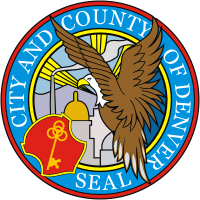
Brian Spano, chairman of the Denver Board of Ethics, has resigned due to a potential conflict of interest.
Spano is a law partner with Kristin Bronson, the newly appointed city attorney. Mayor Michael Hancock appointed Bronson in mid-August, and she will begin her position with the city on October 17.
Because the city attorney occasionally appears before the Board of Ethics, Spano is stepping down to avoid any questions about future conflicts of interest, real or perceived. His term was set to end in April. His resignation is effective October 19.
August 20, 2014 •
Chicago Board of Ethics Submits Revised Rules to Council
The Board of Ethics formally submitted its revised Rules & Regulations to the City Council on August 19. The rules govern board activities in conformation with the provisions of the Governmental Ethics Ordinance. Unless the City Council, by majority vote, […]
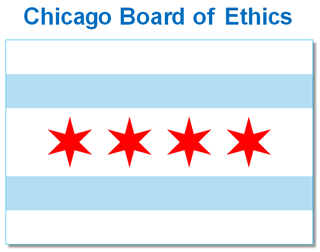 The Board of Ethics formally submitted its revised Rules & Regulations to the City Council on August 19. The rules govern board activities in conformation with the provisions of the Governmental Ethics Ordinance.
The Board of Ethics formally submitted its revised Rules & Regulations to the City Council on August 19. The rules govern board activities in conformation with the provisions of the Governmental Ethics Ordinance.
Unless the City Council, by majority vote, votes to disapprove them, the rules will become effective 45 days after submission.
March 28, 2014 •
Performance of Ordinary Job Responsibilities Leads to Reverse Revolving Door Violation for Chicago Employee
On March 21, the Chicago Board of Ethics posted a summary of its reverse revolving door ruling on the city’s website. The ruling comes from a case brought before the board for the purpose of reviewing the conduct of a […]
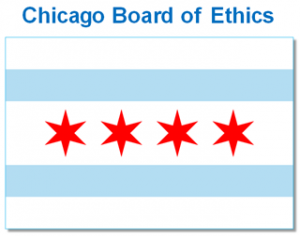
On March 21, the Chicago Board of Ethics posted a summary of its reverse revolving door ruling on the city’s website. The ruling comes from a case brought before the board for the purpose of reviewing the conduct of a department director.
Chicago’s reverse revolving door ordinance prohibits employees or officials from personally participating in a decision-making capacity as to their immediate pre-city employers or clients for a period of two years after joining the city.
The board ruled an employee involved in a procurement process for the city violated the reverse revolving door provision even though he consistently avoided extraneous contact with personnel from his pre-city employer and from its umbrella organization. Simply scoring RFP responses in addition to training or meeting with employees from a pre-city employer or affiliate in the ordinary course of employment constitutes a minor violation.
December 20, 2013 •
Philadelphia Board of Ethics Struggles to Enact Gift Regulations
The Philadelphia Board of Ethics staff has released a revised gift proposal following claims its initial proposed limits were too lax. The new suggested limits are a ban on gifts of more than $100, with a limit of $25 on […]
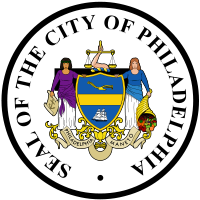 The Philadelphia Board of Ethics staff has released a revised gift proposal following claims its initial proposed limits were too lax. The new suggested limits are a ban on gifts of more than $100, with a limit of $25 on cash gifts, per calendar year from any source not a family member of the recipient. The initial limits proposed were $200 per year, with a cap of $50 for cash gifts, resulting in outcry from watchdogs.
The Philadelphia Board of Ethics staff has released a revised gift proposal following claims its initial proposed limits were too lax. The new suggested limits are a ban on gifts of more than $100, with a limit of $25 on cash gifts, per calendar year from any source not a family member of the recipient. The initial limits proposed were $200 per year, with a cap of $50 for cash gifts, resulting in outcry from watchdogs.
The new proposed limits were greeted with skepticism, however, because the provision allowing for cash gifts remained. Executive Director Shane Creamer insisted the Board cannot ban cash gifts altogether because the city code permits cash gifts, prompting the Board to decide on formally requesting the City Council to consider amending the code.
The suggested limits could drop yet again before the Board votes, as a number of Board members suggested a $50 annual limit was preferable. The Board could potentially vote on the rules at its January meeting.
Due Date Remains Same
 The Philadelphia Board of Ethics issued an advisory alert announcing a delay in the availability of their online filing system for receipt of lobbyist and principal’s quarterly expense reports. The board’s online expense report function will not be available by April 30, the next date the reports are due.
The Philadelphia Board of Ethics issued an advisory alert announcing a delay in the availability of their online filing system for receipt of lobbyist and principal’s quarterly expense reports. The board’s online expense report function will not be available by April 30, the next date the reports are due.
However, because the quarterly expense reports, covering January 3 through March 31, remain due on April 30, the board intends to create an interim paper form expense reporting method. Lobbyists and principals will be able to fill out the interim form on the board’s website, which can then be downloaded and signed. The signed copy must be mailed or delivered to the board by the same April 30 deadline.
The board will advise all registered principals when the interim reporting method becomes available.
The current registration procedure is unaffected by the board’s announcement.
October 31, 2011 •
Detroit Voters to Consider City Charter
Charter Proposes Ethics and Lobbying Reforms
 On November 8, Detroit voters will consider a city charter proposed to reform the city government by bolstering ethics and reducing corruption. The proposed charter creates a board of ethics and the office of inspector general to investigate alleged ethical or criminal violations.
On November 8, Detroit voters will consider a city charter proposed to reform the city government by bolstering ethics and reducing corruption. The proposed charter creates a board of ethics and the office of inspector general to investigate alleged ethical or criminal violations.
The charter seeks to improve transparency by requiring lobbyists and contractors to reveal financial connections with elected officials. Additionally, public servants are prohibited from accepting a gift, honoraria, or anything of value from individuals or companies seeking to do business with the city and a company can be barred from doing business with the city if found to be involved in contractual bribery or corruption.
Photo of the Detroit skyline by Shawn Wilson on Wikipedia.
September 22, 2011 •
Philadelphia Board of Ethics Approves Lobbying Regulations
Lobbyist Registration Delayed Until November
 The Philadelphia Board of Ethics has approved proposed regulations that define lobbying activity and describe how lobbyists must register and report expenditures.
The Philadelphia Board of Ethics has approved proposed regulations that define lobbying activity and describe how lobbyists must register and report expenditures.
If the regulations are approved by the Law Department, they could become effective in early October. A previous board decision to provide a 30 day grace period would not require lobbyist registration until November.
Additionally, registration could begin only when the board has an online registration system in place. Shane Creamer, executive director of the board, stated he hoped the online registration system would be ready in November.
July 7, 2011 •
Enforcement of Philadelphia Lobbying Law Delayed
Law Facing Challenges from Philadelphia Bar Association
 The Philadelphia Board of Ethics has announced it will delay enforcement of the city’s lobbying law until 30 days after the effective date of proposed board regulations.
The Philadelphia Board of Ethics has announced it will delay enforcement of the city’s lobbying law until 30 days after the effective date of proposed board regulations.
According to a board resolution, the earliest that enforcement of the lobbying law may begin is September 26, 2011. P.C.C. §20-1200, which created Philadelphia’s lobbying law, became effective July 1. The board has previously announced that lobbyist registration will not begin until July 18, 2011 because of delays in implementing the electronic registration system.
Additionally, the Philadelphia Bar Association has filed suit challenging Philadelphia’s new lobbying law as being too far reaching. The Bar Association contends that the law’s definition of the term “lobbyist” unfairly targets lawyers who are not engaged in lobbying activities, and that only the state Supreme Court can regulate lawyers.
State and Federal Communications, Inc. provides research and consulting services for government relations professionals on lobbying laws, procurement lobbying laws, political contribution laws in the United States and Canada. Learn more by visiting stateandfed.com.

